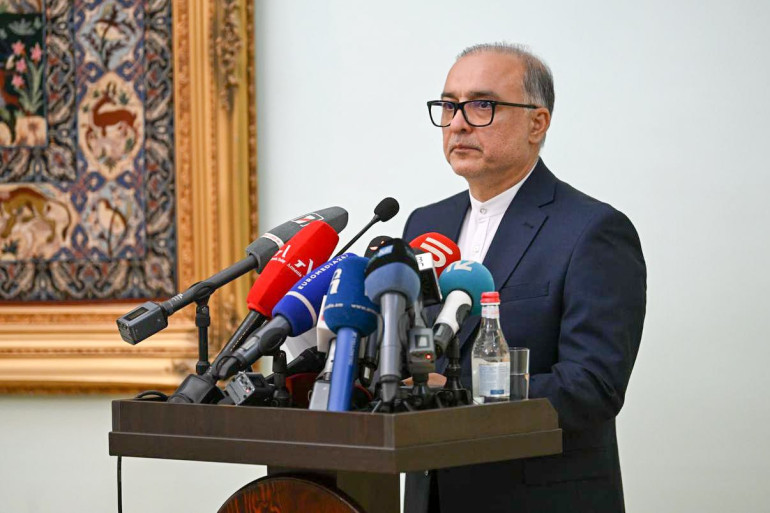Iran’s Ambassador to Armenia Mehdi Sobhani held a press conference in Yerevan on Tuesday, addressing a range of issues stemming from the ongoing Iran-Israel conflict, including potential regional security risks, cargo disruptions, foreign involvement, the safety of Armenian citizens in Iran, Tehran’s position toward Azerbaijan, and appreciation for Armenia’s stance during the crisis, reports Zartonk Media.
Commenting on whether Azerbaijan could take advantage of the crisis to attack Armenia’s Syunik Province, Sobhani reaffirmed Iran’s vigilance and commitment to its regional red lines.
“We are closely following the developments unrolling in the region,” he said. “We are in touch with the countries of the region, we express our concerns to them, we have very clear red lines, and we have proven that we will not deviate from our red lines. We live in a world of possibilities, some of which may cause concern. However, we deal with facts, we remain vigilant.”
He added: “Red lines are our vital lines, and Iran’s positions will never change about its red lines.”
Sobhani also emphasized Iran’s close working relationship with Yerevan. “I believe the Armenian government is also following the developments. We have very close relations with the Armenian government and hold regular meetings,” he said, adding, “The behavior of countries during this period will affect our future relations with them. Friends and enemies are known in difficult times.”
He added that all countries in the region want tensions to de-escalate, as this is in their common interest.
Regarding Baku, he confirmed that Iran remains in dialogue with Azerbaijan on sensitive matters. Sobhani said, “We have spoken about the issues of interest to us, and we have also spoken, and will discuss possible concerns,” adding, “The official position of countries is important to us.” He noted that Azerbaijan had condemned Israel’s aggression.
On the subject of foreign involvement, Sobhani warned that Iran will reevaluate its diplomatic ties if it confirms any nation assisted Israel in its strikes. “We do not have evidence that certain countries could have participated in these actions,” he said, adding, “But we will conduct a study. And if we come to the conclusion that certain countries have assisted the Zionist regime [i.e. Israel] in these actions, this will affect the relations between Iran and these countries.” He also said that Israel may try to exploit certain countries in the region for its own interests.
Speaking about U.S. involvement and recent statements by former President Donald Trump, Sobhani criticized what he described as Washington’s role in the conflict. “It is obvious to us that the U.S. is helping Israel in this war, and the threats of the U.S. president show that the enemies are on the verge of defeat, and the situation in Tel Aviv has gotten out of control,” he said.
“Mr. Trump is now sitting on a dead horse. It is foolish to repeat the same mistakes and expect a different result,” Sobhani added.
Sobhani added that Iran does not seek escalation but is prepared for any scenario. “We do not want this war to spread to other countries or regions—unless it is forced upon us.”
He said Iranian authorities had detained most of the operatives allegedly working on behalf of Israel. “Most of the Zionist agents in Iran have been arrested,” he said. “Their use shows that the cowardly Israel is not capable of entering into a direct conflict with Iran.”
On the subject of public safety, the ambassador confirmed there have been no reports of Armenian casualties or injuries in Iran due to the hostilities. “There is still no information about any casualties and injuries among Armenians in Iran as a result of the war,” he said. He added that while the number of Armenians who have returned to Armenia is unknown, “a large number of people have left Iran for Russia and Turkey.”
Sobhani also addressed concerns about radiation safety following Israeli strikes on Iranian nuclear sites. “We do not have any information about radiation leakage as a result of attacks on nuclear facilities,” he said, adding, “The International Atomic Energy Agency (IAEA) has not issued a respective report either.” He noted that the Natanz nuclear plant is located far from Armenia and does not pose an immediate threat.
As for disrupted travel, the ambassador confirmed that Iran is taking measures to help people stranded due to flight cancellations. “Tehran is organizing measures to help those from Armenia affected by canceled or delayed flights reach Iran,” he said.
Providing additional detail, Sobhani noted that Iran is currently using Armenian buses for land transportation amid suspended flights. He said, “According to my information, land transportation has decreased; we have problems in this regard, and we are using Armenian buses to transport people,” adding, “Yesterday, we transported about 30 Iranian cultural figures—who had arrived in Armenia from Moscow—from Moscow to Iran by Armenian buses.”
He added that roughly 20 flights per week used to operate between Iran and Armenia before the escalation. At present, travel is limited to overland routes. Sobhani also confirmed that approximately 600 trucks continue to travel between Iran and Armenia daily.
The ambassador concluded by thanking Armenia for its position on the crisis. “We are grateful to the Armenian government for its resolute stance in condemning this aggression,” he said, adding, “We express our gratitude to the noble people of Armenia for their solidarity and support. We feel the spiritual support of the Armenian people.”
Earlier, Armenia’s Foreign Ministry issued a statement condemning Israel’s attack on Iran and calling for an immediate ceasefire and adherence to international law.
The ongoing military confrontation, which began with Israeli airstrikes on June 13, continues to escalate following Iran’s retaliatory response.


